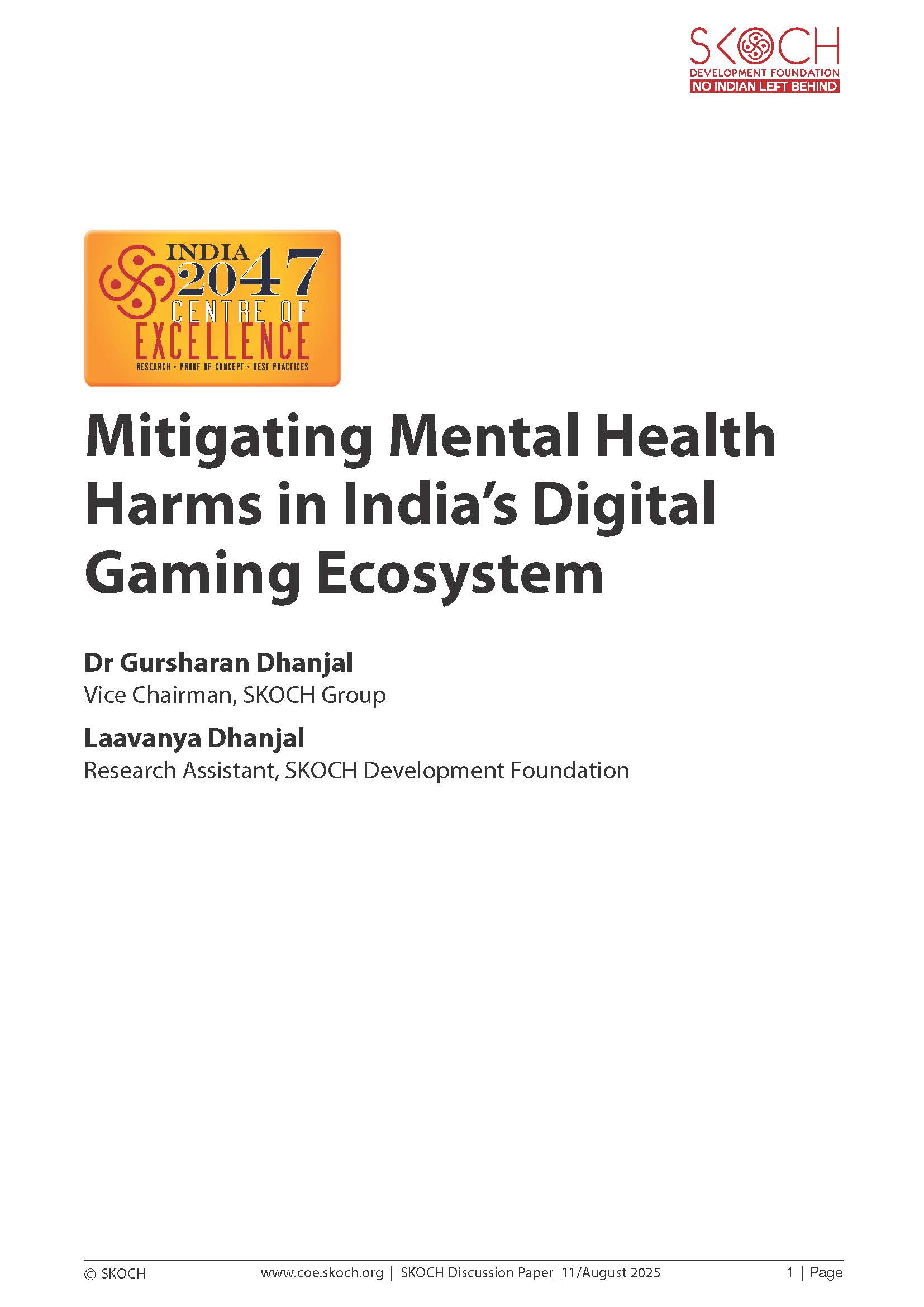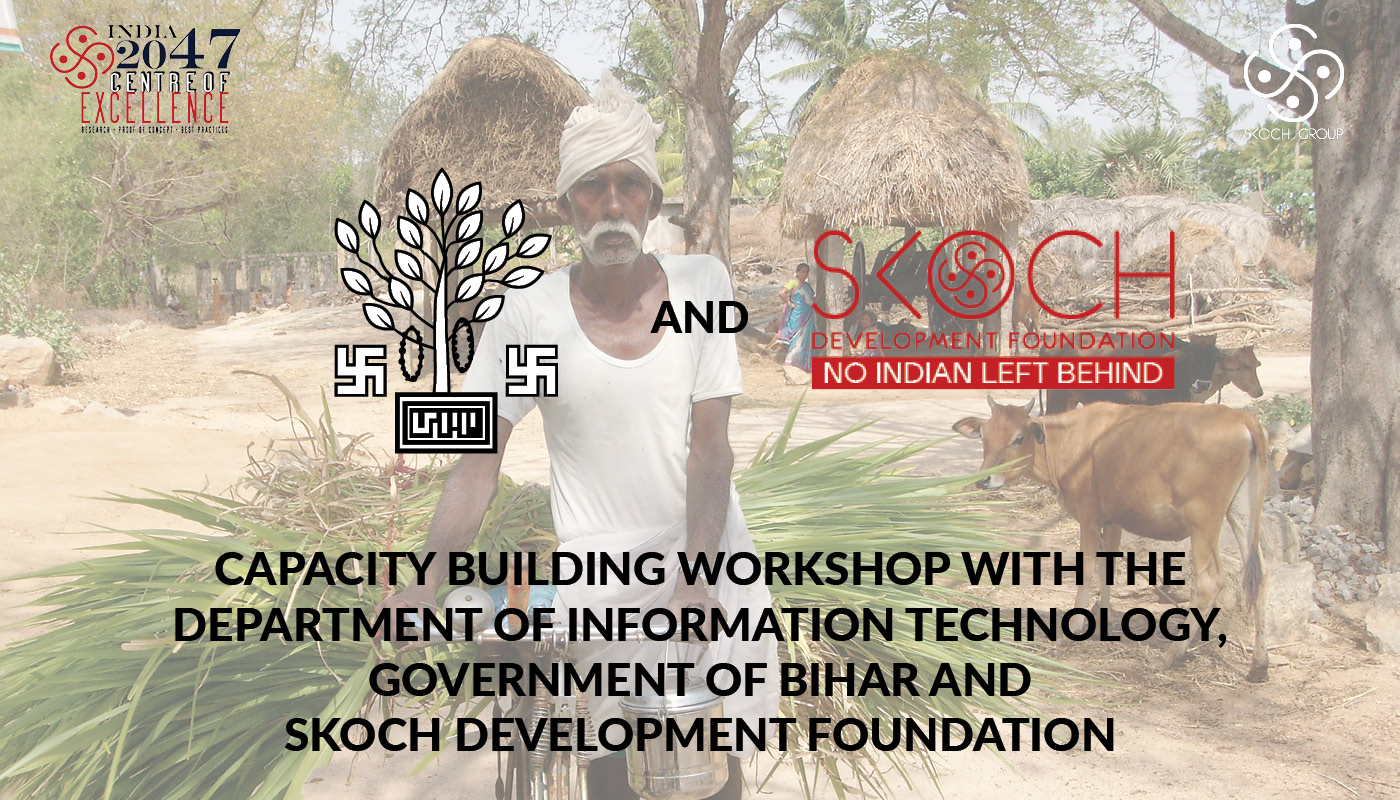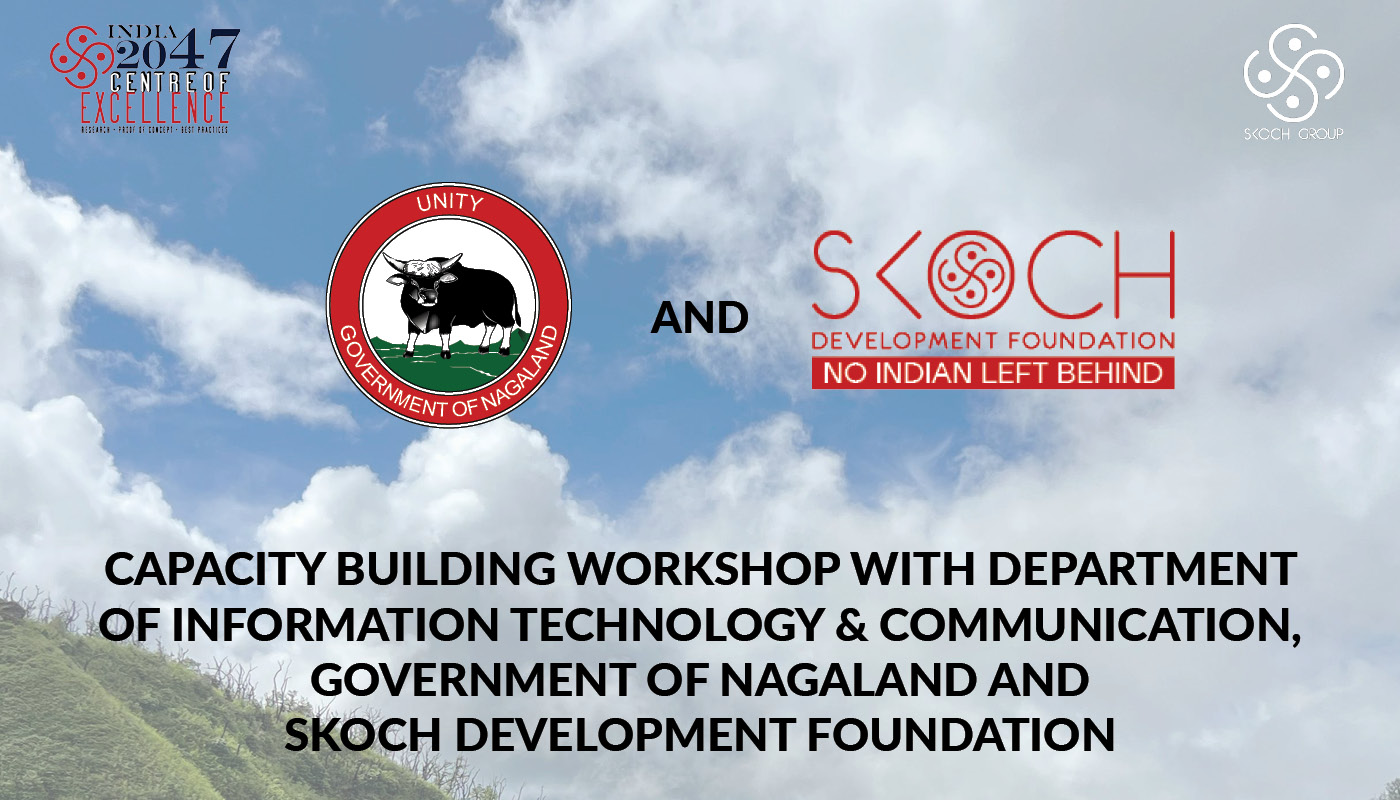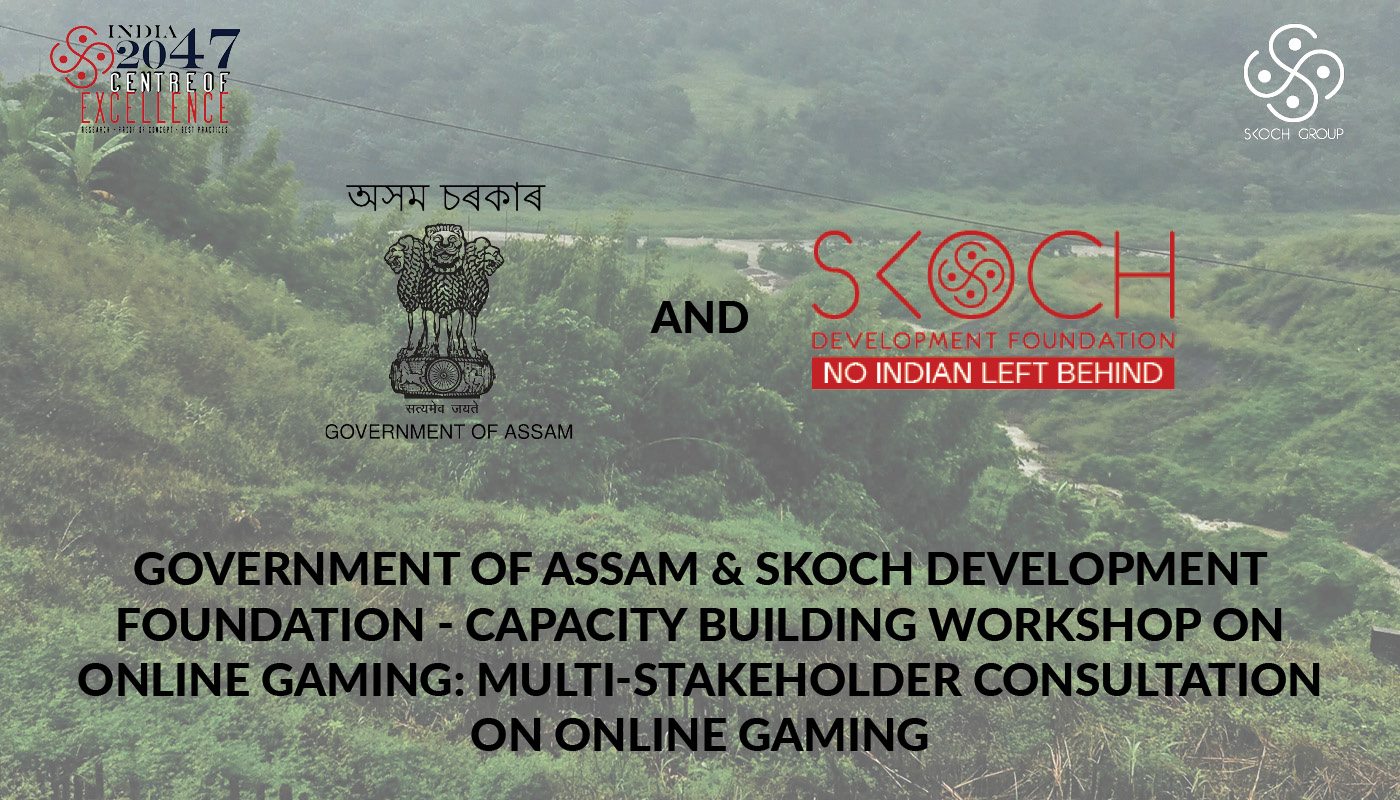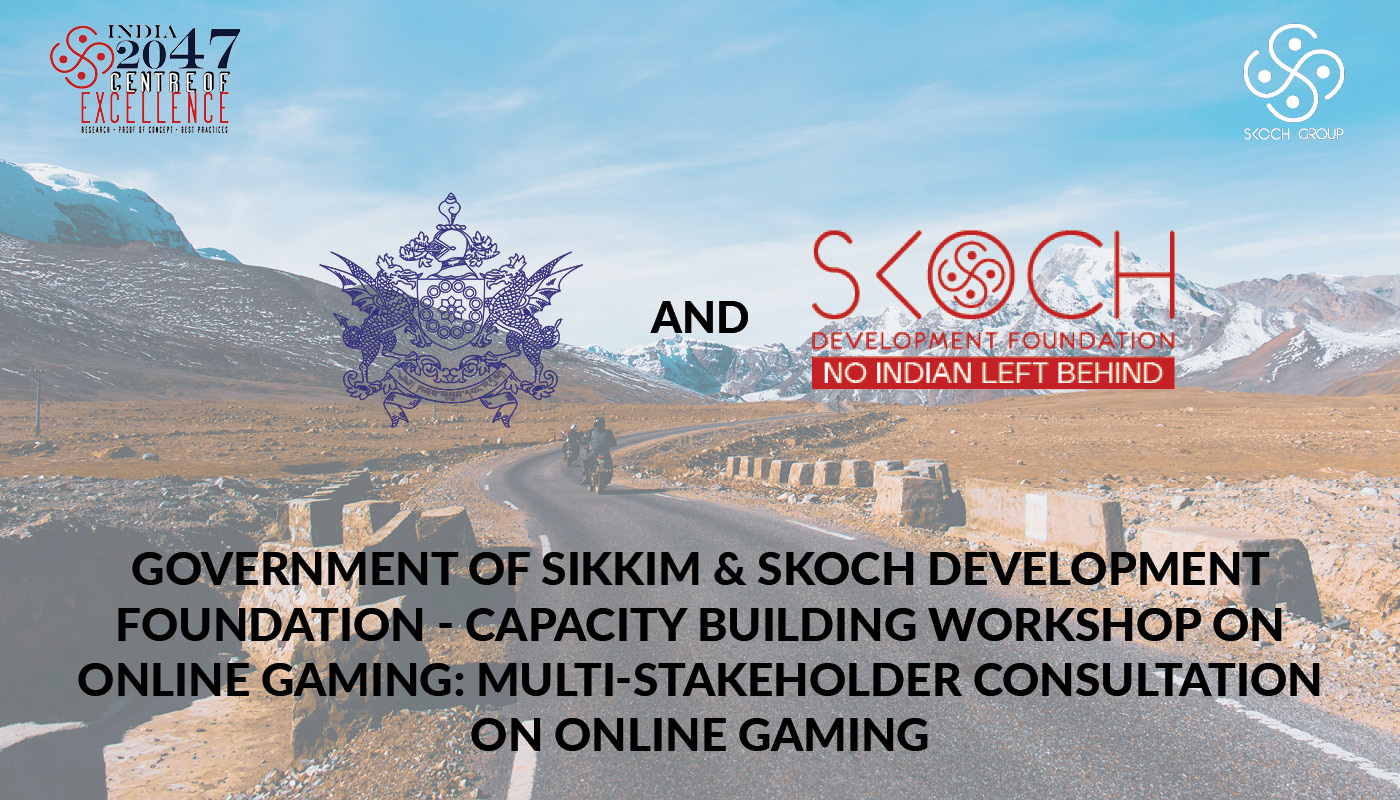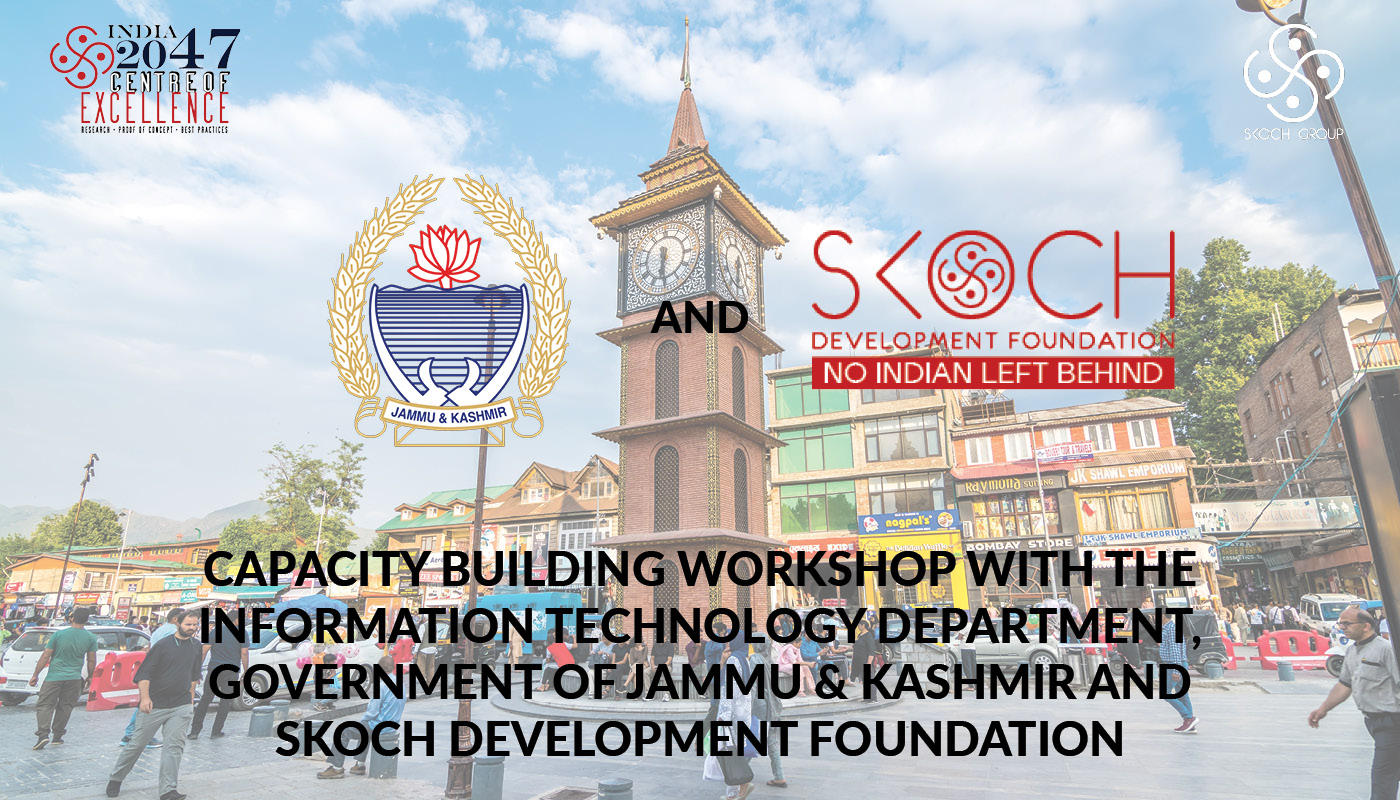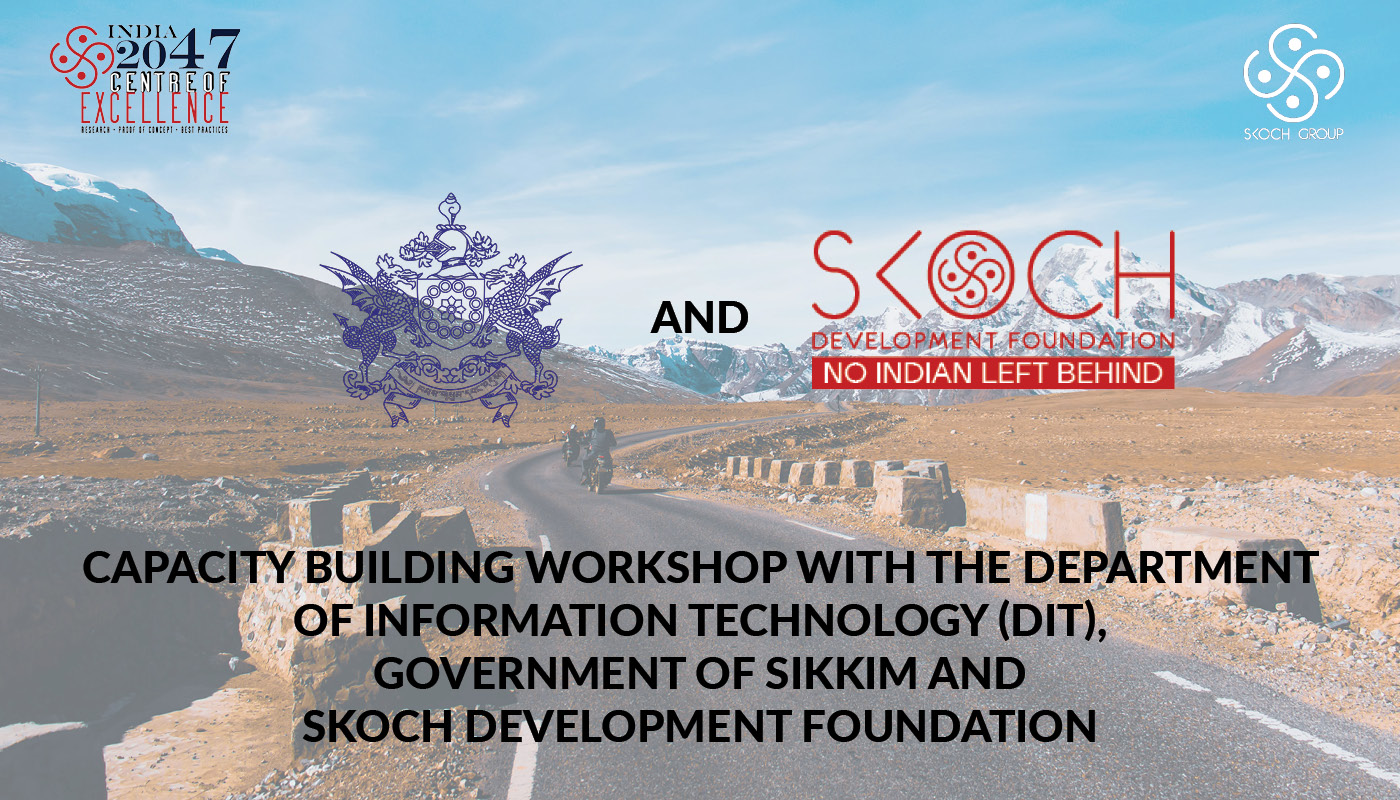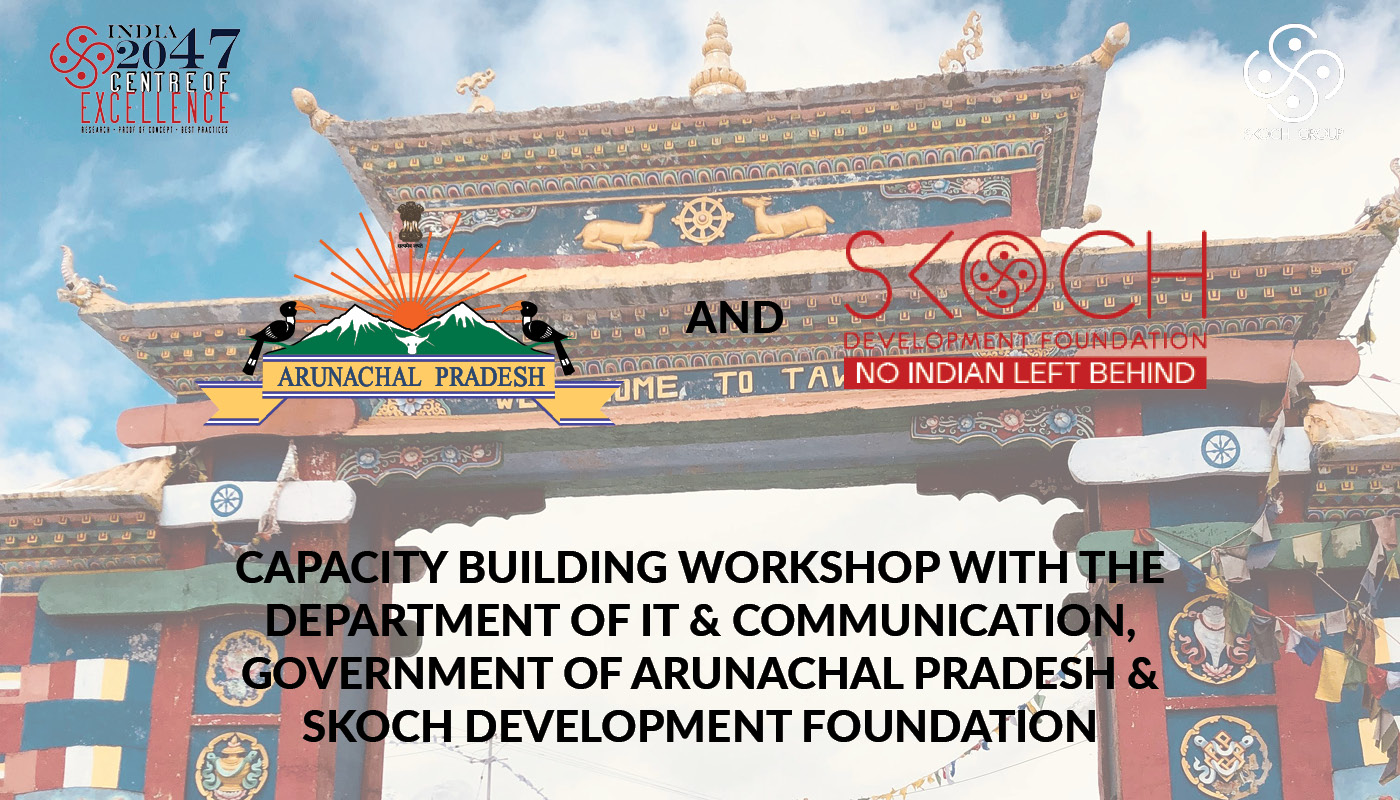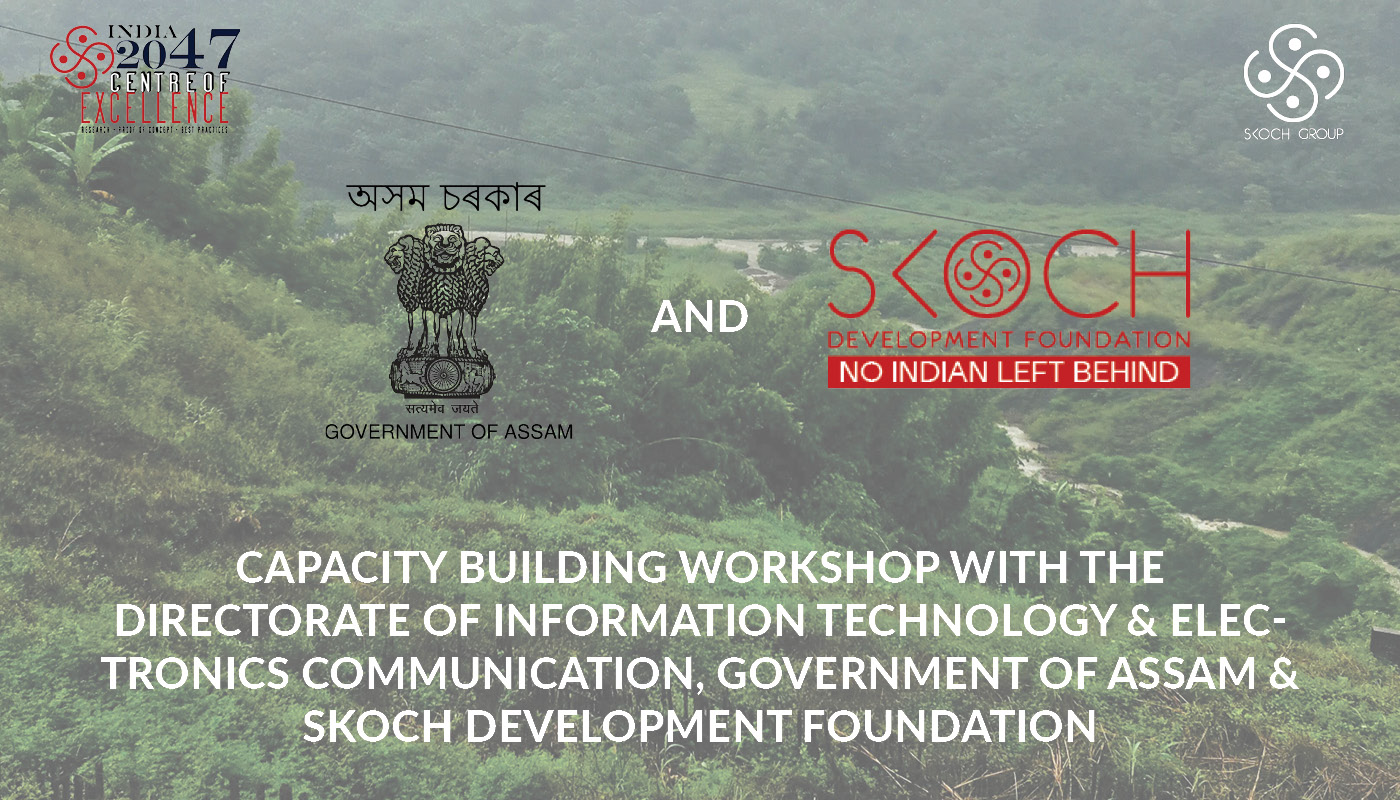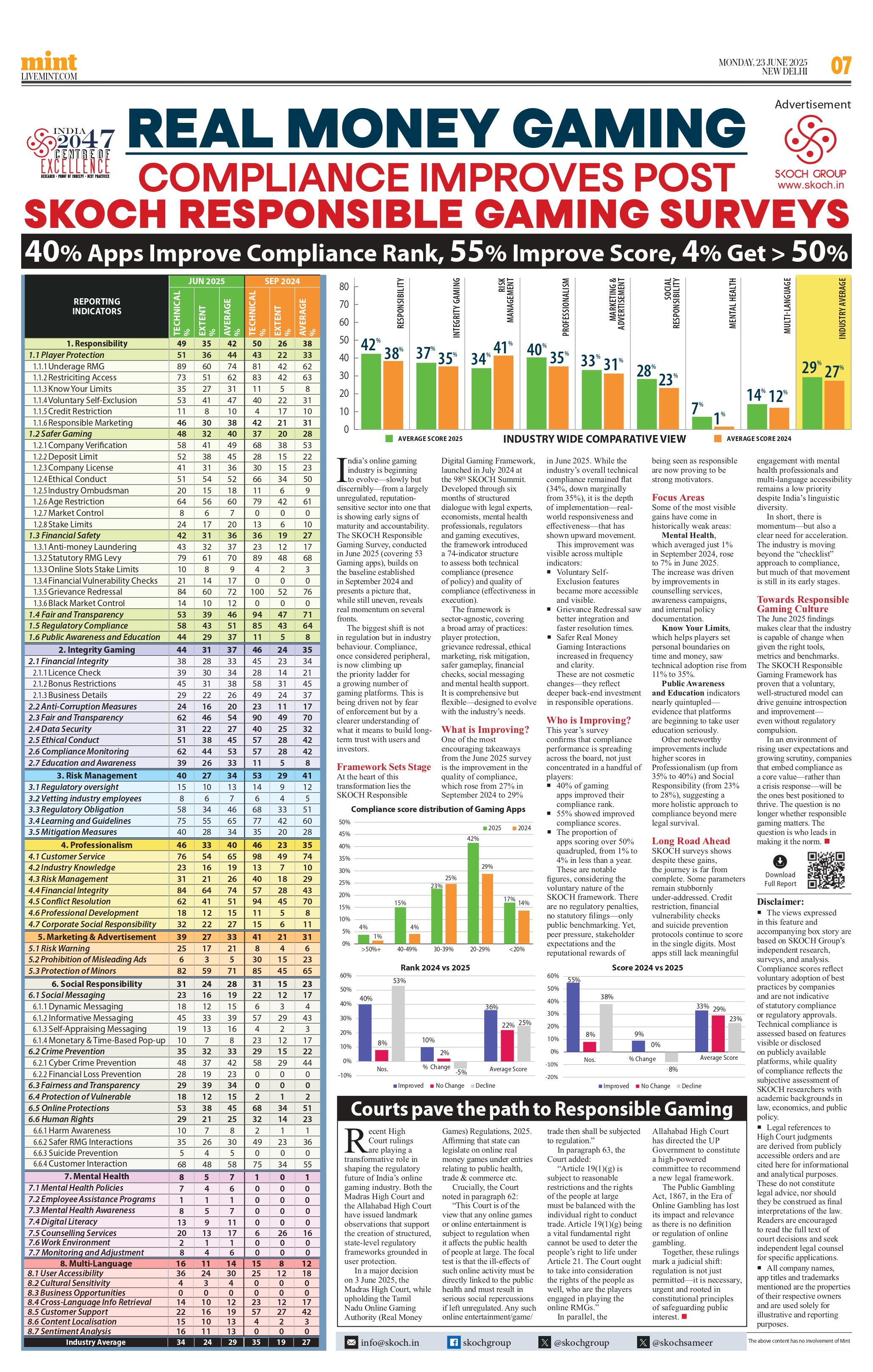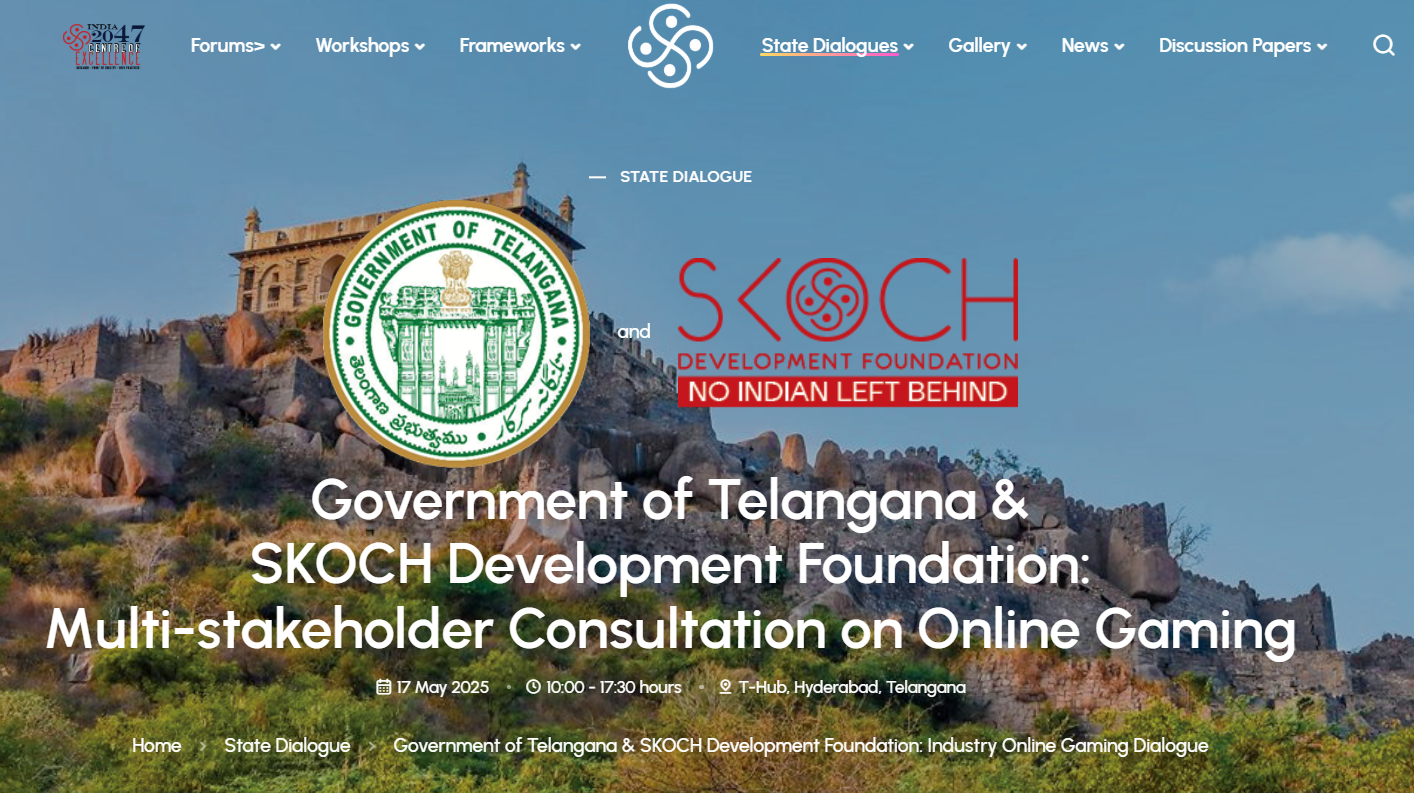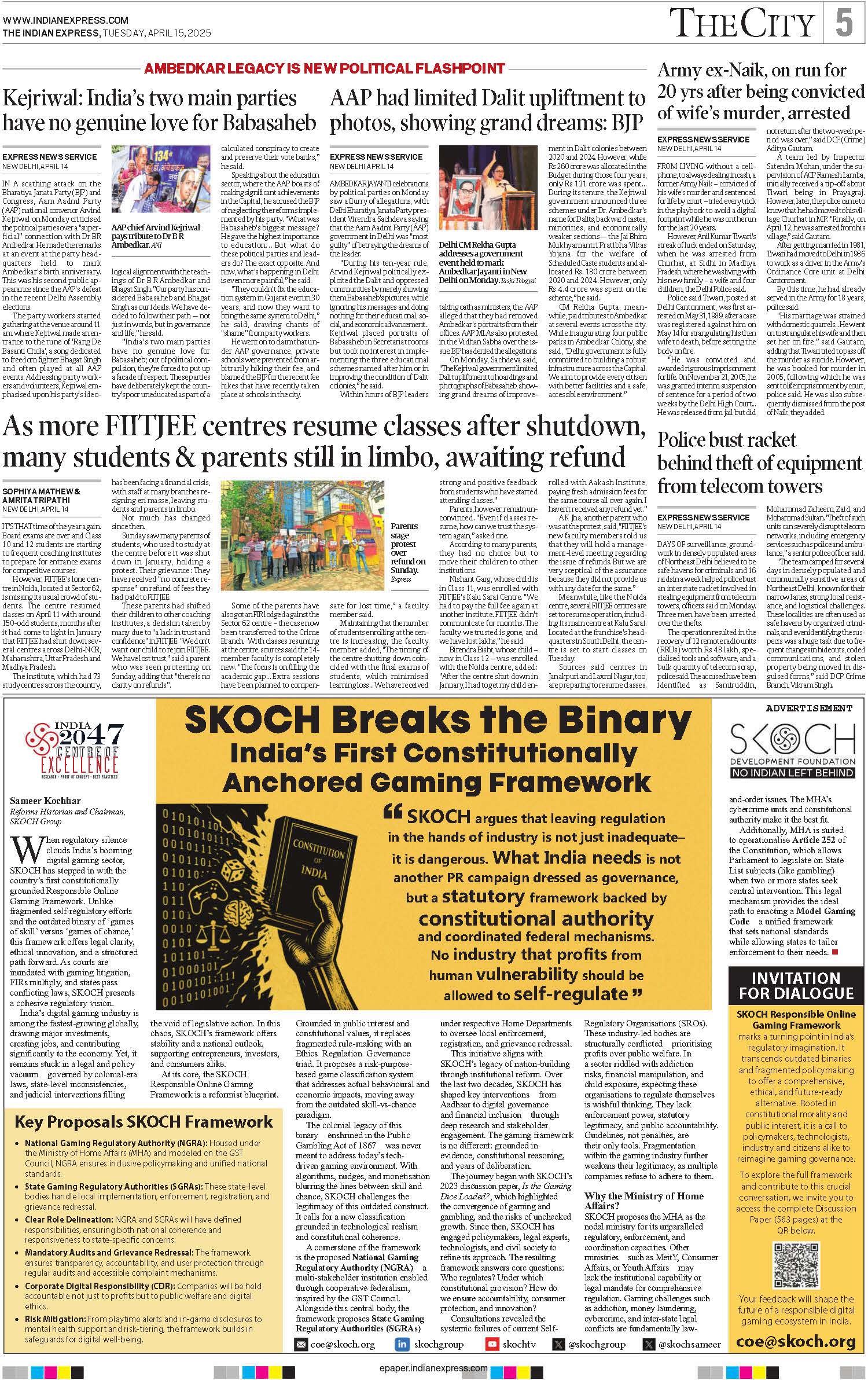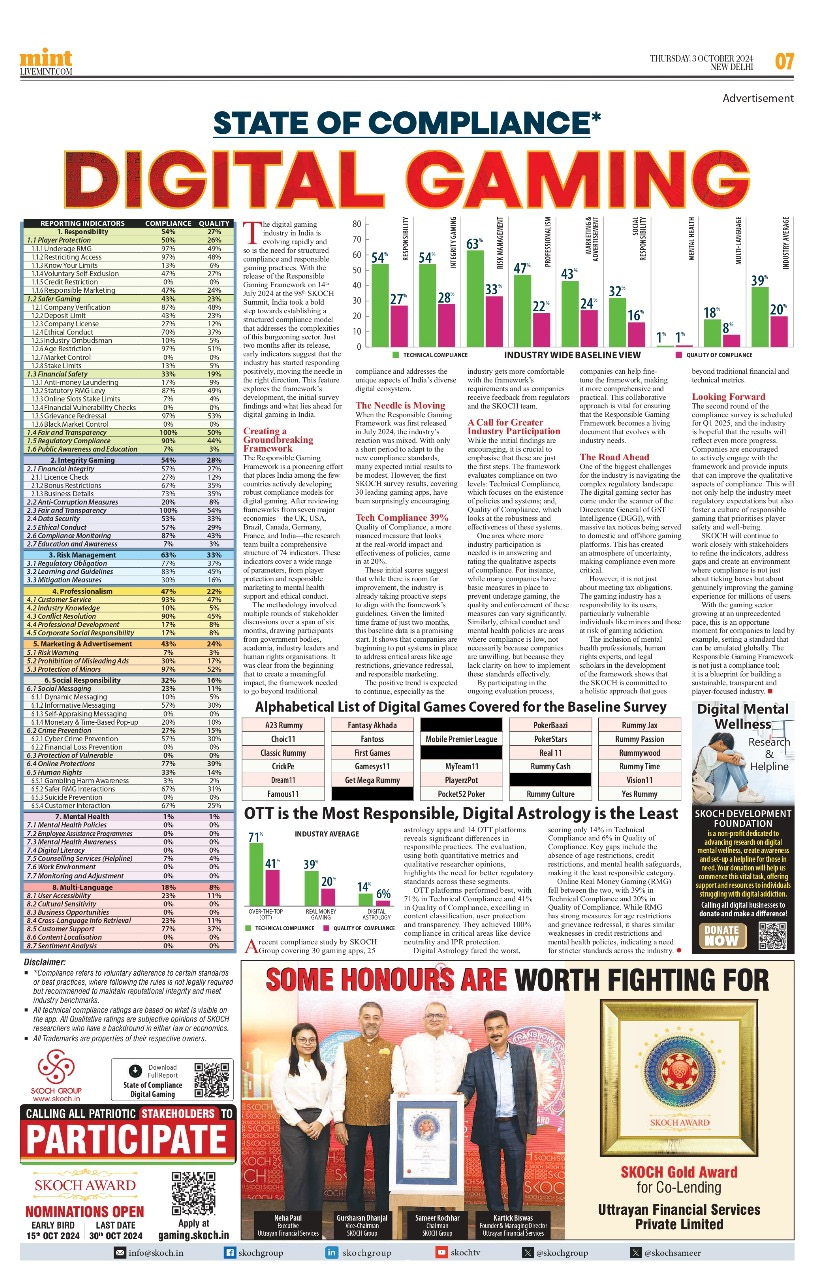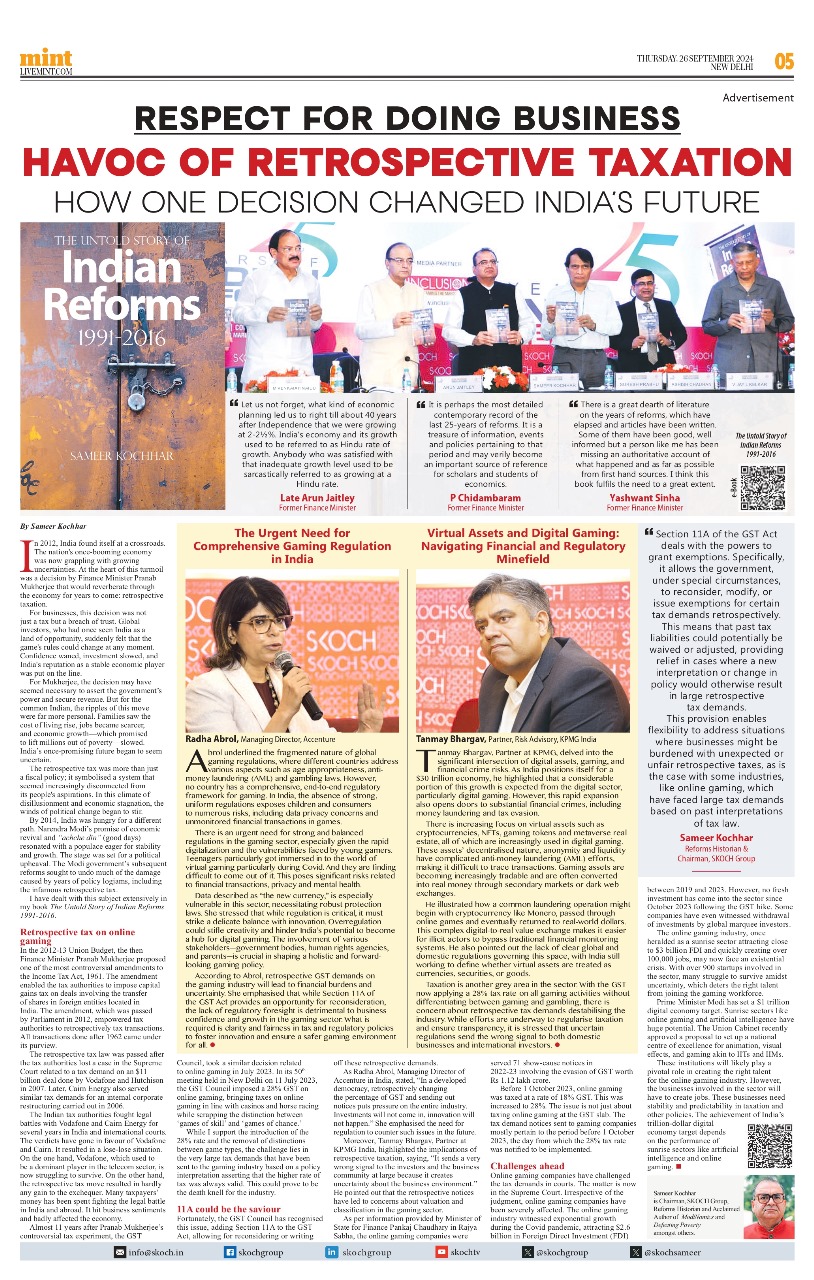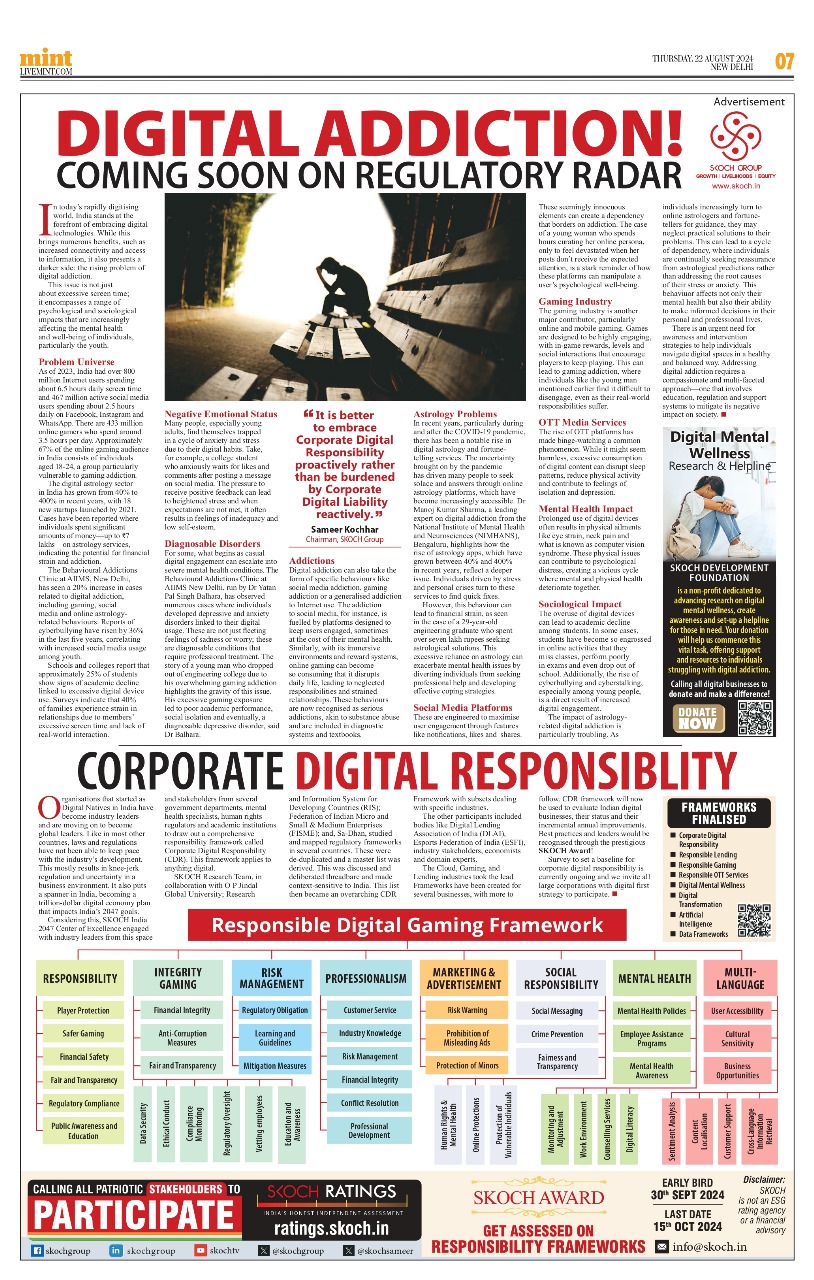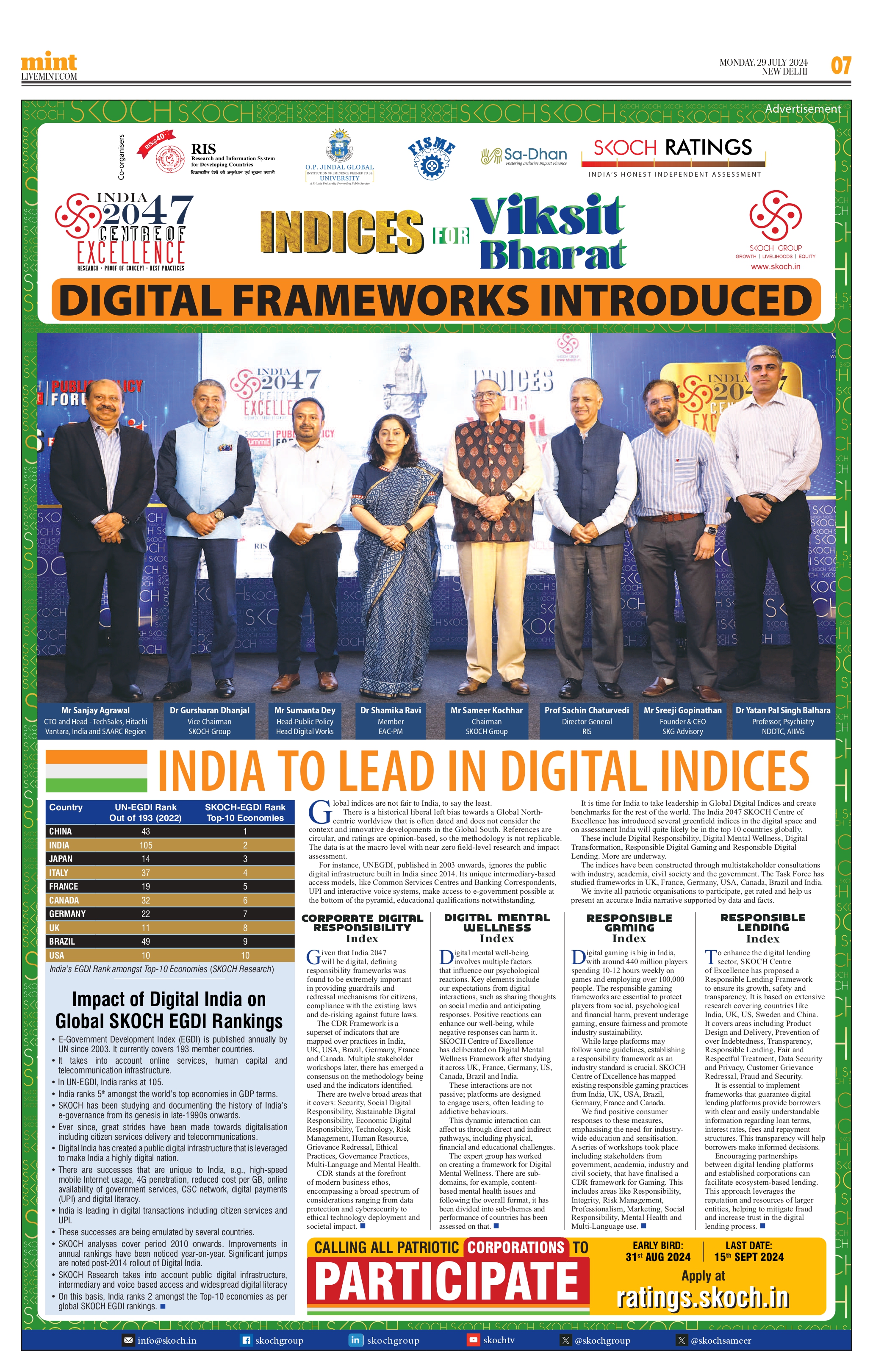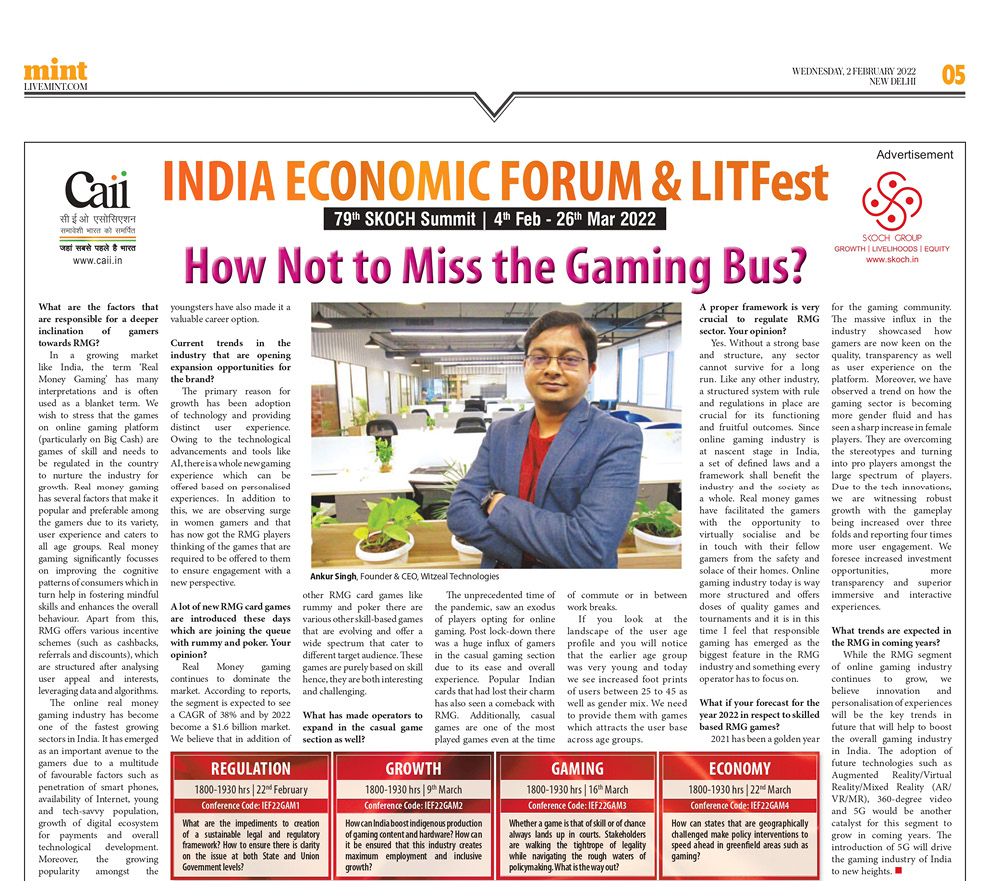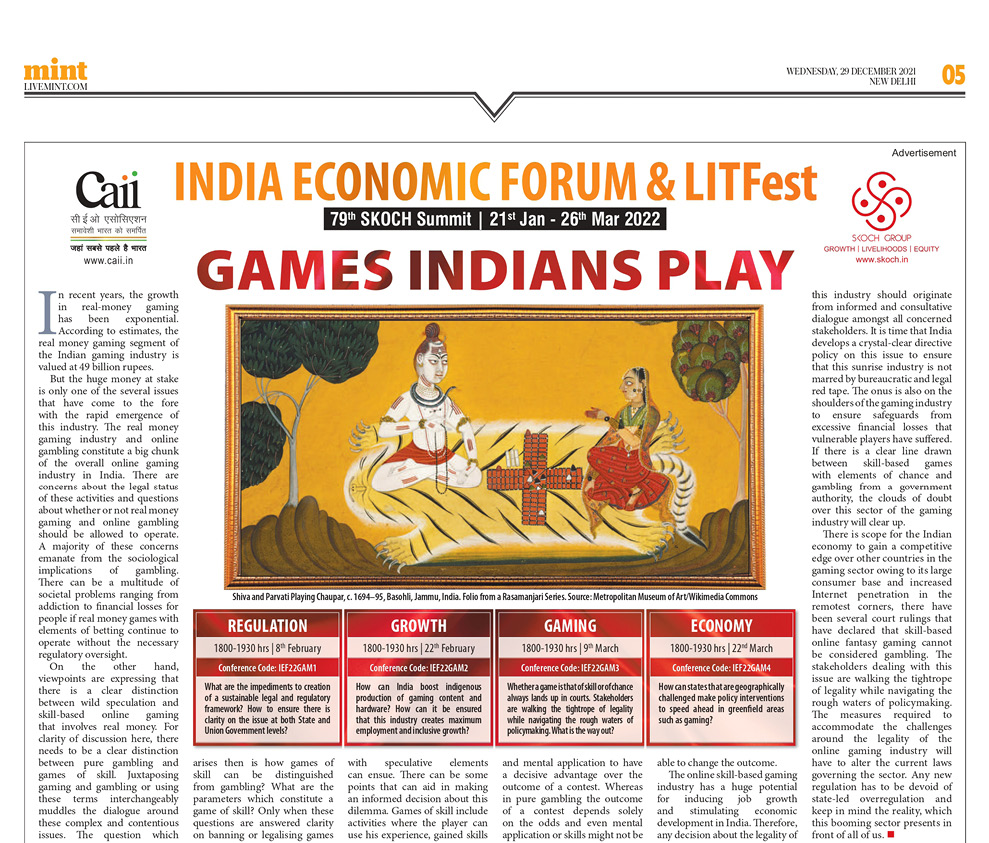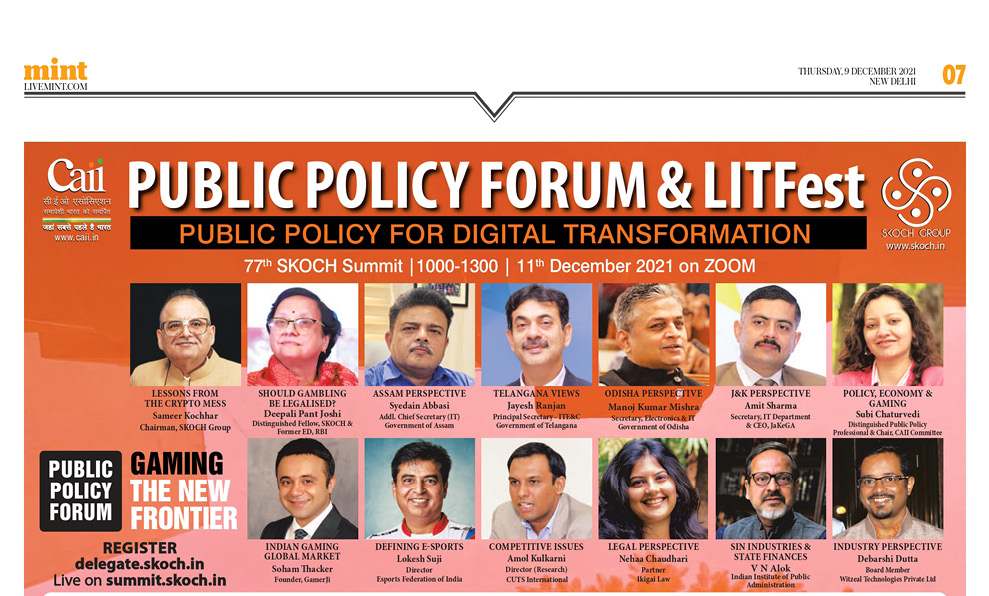Highlights
- India’s Gaming Surge – Digital gaming has rapidly grown into a cultural and economic powerhouse, with hundreds of millions of players shaping new forms of entertainment and community.
- Hidden Health Costs – Alongside this growth, concerns are mounting about gaming’s impact on mental health, emotional well-being, and even physical fitness.
- Regulation Falling Behind – Outdated laws and fragmented oversight struggle to keep pace with the complex risks posed by today’s digital gaming ecosystem.
- A New Framework for Responsibility – The SKOCH model introduces a holistic approach to responsible digital gaming, making user protection and ethical design central to governance.
- Safeguarding the Next Generation – India now has an opportunity to lead globally by ensuring that innovation in gaming evolves hand in hand with mental health and public well-being.
https://skoch.org/skoch-papers/mitigating-mental-health-harms-in-indias-digital-gaming-ecosystem
Capacity Building workshop with the Department of Information Technology, Government of Bihar and SKOCH Development Foundation
25th July 2025
https://gaming.skoch.in#capacity-building-workshop-with-department-of-information-technology-government-of-bihar
Capacity Building workshop with Department of Information Technology & Communication, Government of Nagaland and SKOCH Development Foundation
23rd July 2025
https://gaming.skoch.in#capacity-building-workshop-with-department-of-information-technology-and-communication-government-of-nagaland
Government of Assam & SKOCH Development Foundation - Capacity Building Workshop on Online Gaming: Multi-stakeholder Consultation on Online Gaming
19th July 2025
https://gaming.skoch.in#government-of-assam-and-skoch-development-foundation-capacity-building-workshop-on-online-gaming-multi-stakeholder-consultation-on-online-gaming
Government of Sikkim & SKOCH Development Foundation - Capacity Building Workshop on Online Gaming
Multi-stakeholder Consultation on Online Gaming
17th July 2025
https://gaming.skoch.in#government-of-sikkim-and-skoch-development-foundation-capacity-building-workshop-on-online-gaming-multi-stakeholder-consultation-on-online-gaming
Capacity Building workshop with the Department of Information Technology (DIT), Government of Sikkim and SKOCH Development Foundation
15th July 2025
https://gaming.skoch.in#capacity-building-workshop-with-the-information-technology-department-government-of-jammu-and-kashmir
Capacity Building workshop with the Department of Information Technology (DIT), Government of Sikkim and SKOCH Development Foundation
24th June 2025
https://gaming.skoch.in#capacity-building-workshop-with-the-department-of-information-technology-dit-government-of-sikkim
Capacity Building workshop with the Department of IT & Communication, Government of Arunachal Pradesh and SKOCH Development Foundation
24th June 2025
https://gaming.skoch.in#capacity-building-workshop-with-the-department-of-it-and-communication-government-of-arunachal-pradesh
Capacity Building workshop with the Directorate of Information Technology & Electronics Communication, Government of Assam and
SKOCH Development Foundation
18th June 2025
https://gaming.skoch.in#capacity-building-workshop-with-the-directorate-of-information-technology-and-electronics-communication-government-of-assam
Highlights
- 40% of gaming apps improved their compliance rank in the past year.
- 55% of apps recorded higher compliance scores.
- Share of apps scoring above 50% compliance quadrupled from 1% to 4%.
- Mental Health support scores rose from 1% to 7%, showing greater focus on player wellbeing.
- "Know Your Limits" adoption improved from 11% to 35%, enhancing player protection tools.
- Public Awareness and Education indicators nearly quintupled.
- Courts in Tamil Nadu and Uttar Pradesh backed structured regulation to protect users.
https://inclusion.in/news/2025/06/real-money-gaming/
Regulating Online Gaming - A Constitutional and Legal Analysis
Rohan Kochhar, SKOCH Law Offices presenting at Multi-stakeholder Consultation on Online Gaming - Government of Telangana & SKOCH Development Foundation.
Highlights
- States are constitutionally empowered to regulate online gaming, including games of skill, under entries in the State and Concurrent Lists. This has been upheld by recent judgments such as AIGF v. State of Tamil Nadu, reaffirming the role of states in ensuring public safety and welfare.
- The traditional legal distinction between games of skill and chance is deemed insufficient. A harm-based framework is advocated instead, focusing on the impact on users—especially addiction and mental health—regardless of the nature of the game.
- The 2023 IT Amendment Rules do not constitute comprehensive central legislation on online gaming. Hence, the doctrine of "occupied field" does not apply, and States remain free to legislate to address public interest concerns.
- The SKOCH Framework is presented as a supplementary, not conflicting, structure that can coexist with central IT Rules. It promotes cooperative federalism, suggesting both Center and States collaboratively reinforce user safety.
- Self-regulation is critiqued as insufficient in high-risk, high-impact sectors like online gaming. The lack of accountability, standardized benchmarks, and effective enforcement mechanisms necessitates a move towards co-regulation or statutory oversight.
- The speech concludes with an appeal for a collaborative, ethically guided ecosystem where innovation thrives under a regulatory framework that protects users, especially vulnerable groups, and fosters public trust—positioning Telangana as a potential leader in this transformation.
https://gaming.skoch.in#dregulating-online-gaming-a-constitutional-and-legal-analysis
Digital Mental Health
Dr Yatan Pal Singh Balhara, Professor of Psychiatry, Behavioral Addictions Clinic (BAC), All India Institute of Medical Sciences (AIIMS) presenting at Multi-stakeholder Consultation on Online Gaming - Government of Telangana & SKOCH Development Foundation.
Highlights
- At AIIMS, New Delhi, Dr. Balhara’s clinic addresses both treatment for those already affected by gaming addiction and preventive support for healthy gaming behaviors—without engaging in normative debates over gaming's merits.
- The World Health Organization officially included "gaming disorder" in the ICD-11 as a diagnosable condition in 2018. Despite this, India lacks sufficient mental health professionals to address the growing number of affected individuals.
- Gaming-related harms span physical (e.g., postural strain, eye problems), psychological (e.g., anxiety, addiction), financial, interpersonal, and societal levels, making it a multifaceted public health issue needing urgent intervention.
- Current Indian laws are outdated and fragmented. Dr. Balhara advocates for a unified, science-based framework involving mental health experts, regulatory agencies, and the gaming industry, emphasizing harm prevention over prohibition.
- He recommends embedding mood prompts, behavioral tracking, ergonomic alerts, and digital detox features within gaming platforms to address neurobiological and somatic impacts, encouraging responsible gaming habits.
- India trails behind other countries in implementing comprehensive mental health frameworks in gaming, including areas like user protection, suicide prevention, transparency, and cybercrime response—highlighting a critical policy and governance gap.
https://gaming.skoch.in#digital-mental-health-dr-yatanpal-singh-balhara
SKOCH Approach to Responsible Gaming Code
Mr Sameer Kochhar, Chairman, SKOCH Group presenting at Multi-stakeholder Consultation on Online Gaming - Government of Telangana & SKOCH Development Foundation.
Highlights
- Emphasizes protecting human rights and mental health in digital-native industries.
- Advocates for a triad approach to ensure ethical standards, regulatory compliance, and effective governance.
- Shifts focus from skill vs. chance to regulatory outcomes based on gaming objectives.
- Highlights confusion and disputes between state and central authorities in regulating digital industries.
- Discusses the need for balanced regulation to support economic growth and job creation.
- Critiques low industry compliance rates, especially in mental health and multilingual communication.
https://gaming.skoch.in#skoch-approach-to-model-gaming-code
The Government of Telangana, in collaboration with SKOCH Development Foundation, is leading the digital economy drive and fostering creative industries. They are organising a multistakeholder consultation on an Online Digital Gaming Code for Telangana.
SKOCH, with extensive research in online gaming and responsible digital consumption, has prepared a Discussion Paper available for download at https://skoch.org/discussion-papers/framework-for-regulating-online-gaming.
Scheduled for 17th May 2025 at T-Hub, Hyderabad, this consultation aims to gather insights from key stakeholders, entrepreneurs, and industry founders. The objectives include:
- Providing feedback on the Discussion Paper (submission deadline: 30th April 2025).
- Assessing the revenue loss due to tax foregone in online gaming.
- Offering recommendations to safeguard citizens from socio-economic risks.
Interested participants can contribute by sharing their perspectives on the paper and the proposed framework. To join the consultation, email your inputs and participant details to the following addresses by 30th April 2025: coe@skoch.org, agniv.mukherjee@ycp.com, suhas.reddy@ycp.com (Government of Telangana representatives). For more information and registration, visit: https://coe.skoch.org/state-dialogues/multi-stakeholder-consultation-on-online-gaming.
https://gaming.skoch.in#skoch-approach-to-model-gaming-code
Highlights
- SKOCH has introduced the Responsible Online Gaming Framework as the first regulatory approach in India based on constitutional principles. It provides legal clarity in contrast to the outdated ‘skill vs. chance’ classification and fragmented self-regulation. Amidst regulatory ambiguity, increasing litigation, and inconsistent state laws, this framework offers a unified national vision grounded in public interest and ethical innovation.
- The framework replaces the colonial-era skill-chance binary with a risk-purpose-based classification system. This shift recognizes the complex, tech-driven realities of digital gaming—where algorithms, monetisation strategies, and behavioural nudges blur traditional lines. It aligns regulation with actual economic and psychological impacts on users, enabling more nuanced and effective oversight.
- It proposes a National Gaming Regulatory Authority (NGRA) under the Ministry of Home Affairs to set national standards and policy, inspired by the cooperative federalism model of the GST Council. Parallelly, State Gaming Regulatory Authorities (SGRAs) are suggested under state Home Departments to handle local implementation, registration, enforcement, and grievance redressal. This ensures balance between national uniformity and state-specific responsiveness.
- The framework embeds mandatory audits, accessible grievance redressal, and corporate digital responsibility (CDR) into the regulatory structure. These provisions aim to protect users from addiction, exploitation, and financial risks. Tools such as playtime alerts, in-game disclosures, and mental health support mechanisms are emphasized to safeguard digital well-being, especially among vulnerable populations like children.
- Recognizing the law-and-order nature of gaming-related risks—cybercrime, money laundering, addiction—SKOCH proposes the Ministry of Home Affairs (MHA) as the nodal body. MHA’s existing enforcement capabilities and cybercrime infrastructure make it better suited than ministries like MeitY or Youth Affairs. The use of Article 252 of the Constitution allows Parliament to legislate on gaming, a State List subject, through cooperative state involvement—paving the way for a Model Gaming Code.
https://inclusion.in/news/2025/04/skoch-breaks-the-binary/
Highlights
- SKOCH Responsible Digital Gaming Framework: Launched in July 2024 with 74 indicators across eight dimensions (e.g., player protection, ethical marketing, financial transparency, and mental health), providing a multi-stakeholder compliance roadmap.
- Baseline Survey Findings: Evaluated 30 companies, revealing a 34% average compliance rate, with leaders like A23 Rummy (64%) and Dream11 (57%), highlighting gaps in mental health, social responsibility, and ethical marketing.
- Significance of Compliance: Structured frameworks build trust, guide regulation, and foster sustainable growth, while addressing broader societal issues like inclusivity, human rights, and mental health.
- Path Forward: Encourages multistakeholder collaboration, proactive voluntary compliance, and cross-industry benchmarking to position gaming as a global standard for responsible business.
https://inclusion.in/uncategorized/2024/12/respect-for-doing-business-has-gaming-earned-ita-step-towards-compliance-responsibility-and-trust/
Highlights
- GST Evolution: Despite initial resistance, GST has proven transformative, generating significant revenue and enhancing economic efficiency.
- Challenges of Retrospective Taxation: Cases like the Mineral Area Development Authority highlight the financial strain and uncertainty caused by retrospective taxes, often disrupting business operations and undermining investor confidence.
- Online Gaming Taxation: The recent 28% GST on online gaming blurs the distinction between skill and chance, threatening industry growth, innovation, and potential relocation of businesses to tax-free zones.
- Lessons from Vodafone and Cairn: Disputes over retrospective taxation damaged India’s investor trust, prompting the government to repeal such provisions in 2021, emphasizing the need for predictable and fair tax policies.
- Impact on Employment and Startups: Disproportionate taxes, especially retrospective ones, adversely affect public interest, employment opportunities, and the momentum of startups critical for innovation and economic development.
- Call for Equitable Reforms: A shift towards fairness, predictability, and collaborative tax policymaking, such as taxing gross gaming revenue instead of total betting amounts, can foster a growth-oriented and just tax environment.
https://inclusion.in/uncategorized/2024/12/no-indian-left-behindthe-sting-of-retrospective-taxation-and-tax-activism/
Highlights
- Can GST Drive India’s Development Dreams? Simplifying GST, embracing advanced digitisation, and rethinking fiscal priorities can unlock India’s immense growth potential. With bold reforms, innovative governance, and equitable policies, India can achieve its aspiration of becoming a developed nation by 2047. Discover how GST can empower inclusive, sustainable, and technology-driven economic transformation for brighter future
https://inclusion.in/uncategorized/2024/12/no-indian-left-behindcharting-indias-gst-path-to-inclusive-growth/
Highlights
The 100th SKOCH Summit, a landmark event, highlighted India's transformative journey toward inclusive, equitable, and sustainable growth. The discussions transcended technology, focusing on human-centric development, job generation, and bridging regional disparities. The summit explored the potential of AI-led governance and the broader promise of blending technology with grassroots empowerment to ensure no one is left behind. A key focus was India's milestones in inclusive growth. SKOCH’s advocacy for initiatives like the Pradhan Mantri Gram Sadak Yojana (PMGSY) demonstrated the transformative power of rural connectivity in linking communities to markets, education, and healthcare. Similarly, the Mudra Yojana, which created 1.7 crore direct jobs, underscored the tangible impact of policies rooted in inclusivity. Both programs reflected how targeted initiatives can address systemic gaps and foster broad-based development. Education emerged as the bedrock of equitable growth. Sanjay Kumar, Secretary of School Education and Literacy, highlighted critical challenges, including high dropout rates and fragmented school infrastructure, with 37% of government schools having fewer than 50 students. The National Education Policy (NEP) 2020 aims to address these gaps by standardizing curricula, emphasizing skill-building, and offering vocational training. These reforms promise to prepare students for future challenges, moving beyond conventional metrics of academic success. The summit also called attention to human rights in business. Bharat Lal, Secretary General of the NHRC, emphasized the need for inclusivity and equality in corporate practices. From integrating transgender individuals to supporting persons with disabilities, he urged businesses to embed human rights into their operations. The SKOCH Human Rights report on Nifty 50 companies revealed that while technical compliance was high, gaps persisted in workplace equality and mental wellness. Taxation policies came under scrutiny, with Pinky Anand criticizing retrospective taxation for disrupting economic stability and investor confidence. She called for predictable and collaborative tax policies to drive innovation and growth. M Govinda Rao advocated for simplifying India's complex GST system and leveraging AI-driven tax administration to improve efficiency and fairness. The discussions concluded with a collective vision for India’s growth. By addressing structural disparities and fostering innovation across sectors, India can transform its potential into global leadership. As Sameer Kochhar aptly noted, “Inclusive growth is not a destination; it’s a journey.” The summit reinforced the need for continuous efforts to ensure that every individual and community benefits from the nation’s progress.
https://inclusion.in/news/2024/12/no-indian-left-behind-new-dimensions-in-inclusive-growth/
The Sting of Retrospective Taxation & Tax Activism 16th December 2024
Ms. Pinky Anand, Senior Advocate, Supreme Court of India
Highlights
- GST Evolution: Despite initial resistance, GST has proven transformative, generating significant revenue and enhancing economic efficiency.
- Challenges of Retrospective Taxation: Cases like the Mineral Area Development Authority highlight the financial strain and uncertainty caused by retrospective taxes, often disrupting business operations and undermining investor confidence.
- Online Gaming Taxation: The recent 28% GST on online gaming blurs the distinction between skill and chance, threatening industry growth, innovation, and potential relocation of businesses to tax-free zones..
- Lessons from Vodafone and Cairn: Disputes over retrospective taxation damaged India’s investor trust, prompting the government to repeal such provisions in 2021, emphasizing the need for predictable and fair tax policies.
https://youtu.be/due8GojJFw0
Highlights
A recent compliance study by SKOCH Group covering 30 gaming apps, 25 astrology apps and 14 OTT platforms reveals significant differences in responsible practices. The evaluation, using both quantitative metrics and qualitative researcher opinions, highlights the need for better regulatory standards across these segments. OTT platforms performed best, with 71% in Technical Compliance and 41% in Quality of Compliance, excelling in content classification, user protection and transparency. They achieved 100% compliance in critical areas like device neutrality and IPR protection.
Digital Astrology fared the worst, scoring only 14% in Technical Compliance and 6% in Quality of Compliance. Key gaps include the absence of age restrictions, credit restrictions, and mental health safeguards, making it the least responsible category.
Online Real Money Gaming (RMG) fell between the two, with 39% in Technical Compliance and 20% in Quality of Compliance. While RMG has strong measures for age restrictions and grievance redressal, it shares similar weaknesses in credit restrictions and mental health policies, indicating a need for stricter standards across the industry.
https://gaming.skoch.in#state-of-compliance-digital-gaming
Highlights
- In 2012, then Finance Minister Pranab Mukherjee introduced retrospective taxation, which harmed business sentiment and deterred global investors, impacting India’s reputation as a stable economic destination.
- The retrospective tax amendment led to prolonged legal battles with Vodafone and Cairn Energy. While verdicts favored these companies, the policy damaged India's economic environment without significant revenue gains for the government.
- In 2023, the GST Council introduced a 28% GST on online gaming, eliminating distinctions between 'games of skill' and 'games of chance.' This move, similar to retrospective taxation, has created substantial tax demands for the industry, raising concerns about its future.
- The gaming industry has been severely affected by retrospective tax demands, leading to reduced investments and a negative impact on business stability. Prominent industry voices like Radha Abrol (Accenture) and Tanmay Bhargav (KPMG) highlighted the adverse signals this sends to investors.
- For the digital economy, which aims to achieve a $1 trillion target, sectors like online gaming and AI are crucial. Stable, predictable taxation policies are necessary to foster growth, investment, and talent development, ensuring India's competitiveness in these sunrise sectors.
https://gaming.skoch.in#havoc-of-retrospective-taxation
State of Voluntary Compliance in Digital Gaming
Mr Sameer Kochhar, Chairman, SKOCH Group presenting at 99th SKOCH Summit in New Delhi
Highlights
- India's first responsible digital gaming index is being created.
- A framework was developed by analyzing seven major economies.
- Mental health and local language support are crucial considerations.
- Multi-stakeholder workshops involved various government and industry representatives.
- Compliance ratings were assessed through mystery shoppers.
- Initial findings show a 39% compliance average among gaming apps.
- Discussions on regulatory frameworks and tax implications are ongoing.
https://gaming.skoch.in#state-of-voluntary-compliance-in-digital-gaming
Digital Assets - New age money and FCC Risks
Mr Tanmay Bhargav, Partner, Risk Advisory, KPMG India at the 99th SKOCH Summit in New Delhi
Highlights
- Digital gaming is crucial for India’s goal of a $30 trillion economy.
- Virtual currencies in gaming include cryptocurrencies and in-game tokens.
- Money laundering risks arise from anonymity and decentralization of digital assets.
- Regulatory frameworks in India are still evolving, impacting taxation and compliance.
- The valuation of virtual assets remains uncertain and challenging.
- Data privacy issues complicate the tracking of digital transactions.
- The gaming industry faces potential retrospective tax implications that could deter investment.
https://gaming.skoch.in#digital-assets-new-age-money-and-fcc-risks-tanmay-bhargav
Regulation in Digital Gaming
Ms Radha Abrol, Managing Director, Accenture at the 99th SKOCH Summit in New Delhi
Highlights
- Highlights the urgent need for regulation in the evolving digital gaming landscape.
- Stresses the importance of safeguarding personal data as the new currency.
- Advocates for regulations that foster innovation without stifling growth.
- Emphasizes parental concern for children’s mental health in the context of gaming.
- Critiques retrospective changes to GST rates impacting the gaming industry.
https://gaming.skoch.in#regulation-in-digital-gaming-radha-abrol
Highlights
- Digital addiction in India is rising, with over 800 million Internet users spending an average of 6.5 hours daily online. This addiction extends beyond screen time, affecting mental health, family relationships, and academic performance.
- Young adults aged 18-24 are particularly susceptible to online gaming addiction, which affects 67% of gamers in this age group. Social media and astrology services have also seen significant growth, leading to financial strain and mental health issues.
- Digital overuse can lead to anxiety, depression, and diagnosable disorders. The Behavioural Addictions Clinic at AIIMS has observed a 20% increase in digital addiction cases, with social media, gaming, and online astrology being primary contributors.
- Social media, gaming, and OTT platforms are specifically engineered to maximize engagement, often leading to addictive behaviours. Digital astrology services, especially post-COVID-19, have seen rapid growth, leading to dependency and financial stress.
- Effective strategies, including education, regulation, and support systems, are necessary to address digital addiction, reduce its impact on society, and promote healthier digital habits.
https://gaming.skoch.in#digital-addiction
Highlights
- SKOCH Centre of Excellence identifies that global indices often assess India using a Global North and European perspective, leading to biased results that overlook India's unique context and development in the Global South.
- SKOCH is developing new indices in areas such as Corporate Digital Responsibility (CDR), ESG, digital governance, digital lending, digital gaming, and human rights to better reflect India’s strengths and create globally applicable indices.
- While UN-EGDI ranks India at 105 in digital governance, SKOCH’s analysis places India 2nd among the top ten economies, highlighting the impact of Digital India initiatives like UPI and public digital infrastructure.
- India has 440 million gamers, and SKOCH has developed a responsible gaming framework focusing on player protection, industry sustainability, and preventing social, psychological, and financial harm.
- SKOCH has studied responsible gaming practices from countries like the UK, USA, and Germany, and organized workshops with diverse stakeholders to finalize a comprehensive CDR framework for gaming, including areas like social responsibility, mental health, and multi-language support.
https://gaming.skoch.in#digital-indices
The Responsibility of Gaming
Mr Sumanta Dey, Head-Public Policy, Head Digital Works at the 98th SKOCH Summit in New Delhi
Highlights
- 440 million players in India engage in digital gaming, highlighting its economic significance.
- Over 100,000 people work in the digital gaming industry, contributing to economic growth.
- A responsible gaming framework is essential to protect against potential social, psychological, and financial harms.
- Platforms reject 80% of new users due to KYC non-compliance, indicating the need for stricter adherence.
- Only 5% of users opt to remove self-exclusion limits, showcasing the effectiveness of responsible gaming measures.
- A task force with diverse stakeholders aims to establish a responsibility framework for digital gaming.
- Emphasizing governance in digital businesses is crucial for scaling and sustaining growth.
https://gaming.skoch.in#digital-indices-sumanta-dey
Digital Mental Health
Dr Yatan Pal Singh Balhara, Professor-Psychiatry, National Drug Dependence Treatment Centre (NDDTC), AIIMS at the 98th SKOCH Summit in New Delhi
Highlights
- Digital spaces influence mental well-being and require careful navigation.
- Expectancy affects how users feel about their digital interactions.
- Digital platforms actively shape user engagement, impacting mental health.
- Negative emotional states and addictions are rising due to excessive digital use.
- Awareness programs in schools are crucial for educating youth on digital wellness.
- New frameworks and indicators are being developed to assess digital mental health.
- Balancing the benefits and risks of digital engagement is essential for mental wellness.
https://gaming.skoch.in#digital-mental-health-yatan-pal-singh-balhara
Responsible Digital Gaming Framework
- Responsible Digital Gaming Framework:
- Core Focus Areas: Responsibility, Integrity Gaming, Risk Management, Professionalism, Marketing & Advertisement, Social Responsibility, Mental Health, Multi-Language Support
- Key Elements of the Framework:
- Player Protection & Safer Gaming: Underage protection, self-exclusion, financial safety, and responsible marketing.
- Financial Safety & Transparency: Anti-Money Laundering (AML), grievance redressal, and user rights.
- Fairness & Regulatory Compliance: Adherence to regulations, licensing checks, and ethical conduct.
- Risk Management & Integrity: Mitigation strategies, compliance monitoring, and regulatory adherence.
- Social Responsibility: Addressing mental health, social messaging, and protecting vulnerable groups.
- Marketing & Advertisement: Transparent messaging, risk warnings, and minor protection.
- Multi-Language Support: Content localization, accessibility, and cultural sensitivity.
- Countries Mentioned:
- Compliant/Framework Adopters: India, United Kingdom (UK), United States of America (USA), Canada, France
- Countries with Compliance Challenges: Brazil (underage gambling restrictions and regulatory gaps), Germany (black market control and incomplete enforcement)
https://gaming.skoch.in#responsible-digital-gaming-framework
Panel Session: Final Frameworks for CDR & Gaming
Final Framework for Corporate Digital Responsibility were accepted at this Multi-stakeholder Roundtable
Copy Linkhttps://gaming.skoch.in#final-frameworks-for-cdr-gaming
Dr Manoj Kumar Sharma, National Institute of Mental Health and Neuro Sciences presenting on the topic 'Astrology: Practice or Addiction' at the workshop Harmonising ESG, CSR, CDR and SDGs
Highlights
- Increased interest in astrology during COVID-19.
- Online astrology services have surged.
- Financial consequences of excessive astrology use.
- Cognitive errors lead to astrology dependence.
- Need for regulation in digital astrology practices.
- Growth of astrological apps and startups.
- Astrology can distract from seeking professional help.
https://gaming.skoch.in#astrology-practice-or-addiction-dr-manoj-kumar-sharma
Dr Gursharan Dhanjal, Vice Chairman, SKOCH Group presenting on the topic 'Responsible Digital Gaming Framework' at the workshop Defining Responsibilty Frameworks: Digital Lending, Gaming, OTT & Intermediaries
Highlights
- Reviewed regulations from multiple countries to create a CDR framework.
- Identified 15 subsections under data security and privacy.
- Emphasized digital inclusion and equitable access in India.
- Highlighted the need for carbon neutrality and e-waste reduction.
- Discussed fair income and employee management in digital contexts.
- Examined integrity and social responsibility in gaming frameworks.
- Stressed the importance of defining regulations to protect India’s digital economy.
https://gaming.skoch.in#responsible-digital-gaming-framework-dr-gursharan-dhanjal
Dr Yatan Pal Singh Balhara, Professor-Psychiatry, National Drug Dependence Treatment Centre (NDDTC), AIIMS presenting on the topic 'Mental Health Dimensions of Digital Business and What can be Done' at the workshop Defining Responsibilty Frameworks: Digital Lending, Gaming, OTT & Intermediaries
Highlights
- Mental health issues arise from various digital activities like gaming and social media.
- The impact of digital platforms on user behavior can lead to mental health concerns.
- Mental health problems can stem from both direct and indirect pathways related to online engagement.
- Behavioral addictions are a significant focus, particularly in vulnerable populations like adolescents.
- Businesses can leverage mental health awareness for growth strategies while ensuring user safety.
- Age-appropriate technology use is crucial for children to mitigate addiction risks.
- A unified regulatory framework is needed for effective management of digital health issues.
https://gaming.skoch.in#mental-health-dimensions-of-digital-business-dr-yatan-pal-singh-balhara
The Government of India has the right reasons to be concerned about game addiction in children, them being exposed to unmonitored in-game purchases, age-inappropriate content and online harassment.
Read More Copy Linkhttps://gaming.skoch.in#children-and-family-safeguards-framework-in-video-games-lokesh-suji
Is the Dice Loaded?
- Cultural and Social Context:
- Gambling has deep historical roots in India and has often shaped its history, such as in the Mahabharata.
- The current rise of the online gaming industry is seen as both an economic opportunity and a societal risk.
- Exponential Growth:
- The online gaming industry has grown rapidly, both globally and in India, with India's market value reaching nearly $3 billion by 2022, growing at an annual rate of 40%.
- Legal and Regulatory Challenges:
- The legal status of online gaming and gambling remains ambiguous in India.
- Recent GST Council decisions have imposed a 28% tax on the full-face value of online gaming, horse racing, and casinos.
- Government Stance:
- The government equates online gaming to gambling and has made clear that taxing these activities does not legalize them in states where they are banned.
- SKOCH Group's Position:
- SKOCH Group advocates for a unified tax and regulation framework for all games, whether skill-based or chance-based.
- Self-regulation is criticized as ineffective, and they emphasize the need for a strong regulatory framework.
- Venture Capital (VC) Influence:
- VCs see online gaming in India as an opportunity due to the lack of strict regulation, often lobbying and litigating to maintain a favorable environment.
- Regulation vs. Self-Regulation:
- The industry prefers self-regulation, but SKOCH argues that it’s prone to conflicts of interest and inefficiency.
- Self-regulation is seen as inadequate without government oversight.
- Taxation and Economic Impact:
- The high GST rate on online gaming is seen as necessary to regulate an addictive industry, but it has sparked fears of job losses and capital flight.
- The job loss argument is countered by comparing the impact to other industries like tobacco, which also face high taxes yet thrive.
- Central vs. State Control:
- Gambling is a state subject, leading to confusion over which authority should regulate online gaming.
- There are constitutional options for central intervention, but they require careful consideration and broad consensus.
- Ethical and Societal Considerations:
- The addictive nature of online gaming raises concerns about mental health and social consequences, particularly for youth.
- Recommendations and Future Steps:
- SKOCH plans to form a National Task Force to address the regulatory framework, taxation, and constitutional clarity around online gaming.
- A Position Paper on Gaming/Gambling is set to be released in early 2024.
https://gaming.skoch.in#is-the-dice-loaded-sameer-kochhar
- Is there a case for reviewing GST on online gaming?
- Whose order of business in the Government is Gaming/Gambling?
- Is it possible to differentiate between games of skill and chance?
- Does India lack policing and enforcement skills in the field of Gaming and Virtual Digital Assets?
- What should be a prudent regulatory framework and structure?
https://gaming.skoch.in#is-the-gaming-dice-loaded
Highlights
- The global online gaming market exceeded $200 billion by 2022, while India experienced a remarkable 40% growth, reaching a value of $3 billion, fueled by cultural roots in gambling.
- The text emphasizes the importance of regulating all forms of gambling, including online gaming, and highlights ongoing debates about distinguishing games of skill from games of chance.
- The proposed 28% GST on the full face value of gaming transactions has sparked controversy, raising questions about fairness and the rationale behind taxing the entire transaction instead of just the platform fees.
- The fantasy sports industry has created thousands of jobs and has the potential to generate even more employment, highlighting the economic significance of online gaming.
- Self-regulation is criticized for lacking accountability and consumer representation, with concerns that it may lead to a fragmented market and allow dominant players to stifle competition.
https://gaming.skoch.in#india-law-forum-feature
Highlights
- The popularity of RMG is attributed to its variety, engaging user experience, and appeal across age groups. It enhances cognitive patterns, offers mindful skill development, and includes incentive schemes such as cashbacks and referrals, driven by data analytics.
- RMG is one of the fastest-growing sectors in India, driven by smartphone penetration, digital payment systems, and a young, tech-savvy population. Technological advancements like AI and the growing participation of women gamers have further expanded the market.
- There is a surge in skill-based games beyond traditional options like rummy and poker. The market is expected to grow at a CAGR of 38%, reaching $1.6 billion. New games catering to diverse audiences are being introduced, emphasizing skill and challenge.
- Casual games gained popularity post-pandemic due to their ease of access and appeal to a broader age and gender demographic. This trend reflects a shift towards providing more inclusive gaming options that suit different preferences and time commitments.
- A robust regulatory framework is essential for sustaining long-term growth in the RMG industry. Proper laws and a structured system can support responsible gaming, ensure user safety, and enhance the credibility of the sector as it matures in India.
https://gaming.skoch.in#ief-and-litfest-economy-and-budget
Highlights
- The Indian real-money gaming segment has experienced rapid growth and is now valued at 49 billion rupees, forming a significant portion of the overall online gaming industry in India.
- There are ongoing debates about the legality and social impact of real-money gaming, including issues related to addiction and financial losses, which call for better regulatory oversight.
- A clear distinction needs to be made between gambling and skill-based gaming, as this will aid in creating a more nuanced regulatory framework. Skill-based games involve player expertise, whereas gambling is determined by pure chance.
- The skill-based gaming industry has the potential to create jobs and stimulate economic development. However, policy clarity and regulations are essential to ensure that the industry grows responsibly.
- Developing a clear, consultative regulatory framework is necessary to differentiate between skill-based games and gambling, without overregulation, to harness the industry's economic potential while safeguarding against social harms.
https://gaming.skoch.in#india-economic-forum




